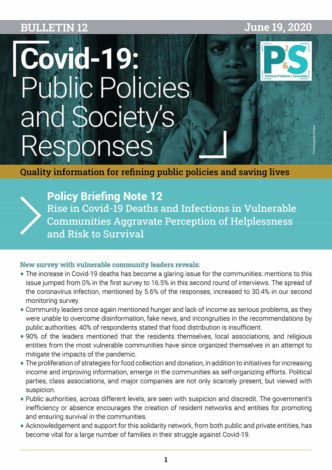New survey with vulnerable community leaders reveals:
- The increase in Covid-19 deaths has become a glaring issue for the communities: mentions to this issue jumped from 0% in the first survey to 16.5% in this second round of interviews. The spread of the coronavirus infection, mentioned by 5.6% of the responses, increased to 30.4% in our second monitoring survey.
- Community leaders once again mentioned hunger and lack of income as serious problems, as they were unable to overcome disinformation, fake news, and incongruities in the recommendations by public authorities. 40% of respondents stated that food distribution is insufficient.
- 90% of the leaders mentioned that the residents themselves, local associations, and religious entities from the most vulnerable communities have since organized themselves in an attempt to mitigate the impacts of the pandemic.
- The proliferation of strategies for food collection and donation, in addition to initiatives for increasing income and improving information, emerge in the communities as self-organizing efforts. Political parties, class associations, and major companies are not only scarcely present, but viewed with suspicion.
- Public authorities, across different levels, are seen with suspicion and discredit. The government’s inefficiency or absence encourages the creation of resident networks and entities for promoting and ensuring survival in the communities.
- Acknowledgement and support for this solidarity network, from both public and private entities, has become vital for a large number of families in their struggle against Covid-19.
Work group responsible
Coordination: Graziela Castello (CEBRAP), Priscila Vieira (CEBRAP) e Monise Picanço (CEBRAP).
Researchers:
- Dafny Almeida (CEBRAP)
- Daniela Costanzo (CEBRAP)
- Jaciane Milanezi (CEBRAP)
- Jonatas Mendonça dos Santos (USP)
- Laura Simões (USP)
- Rodrigo Brandão (USP)


